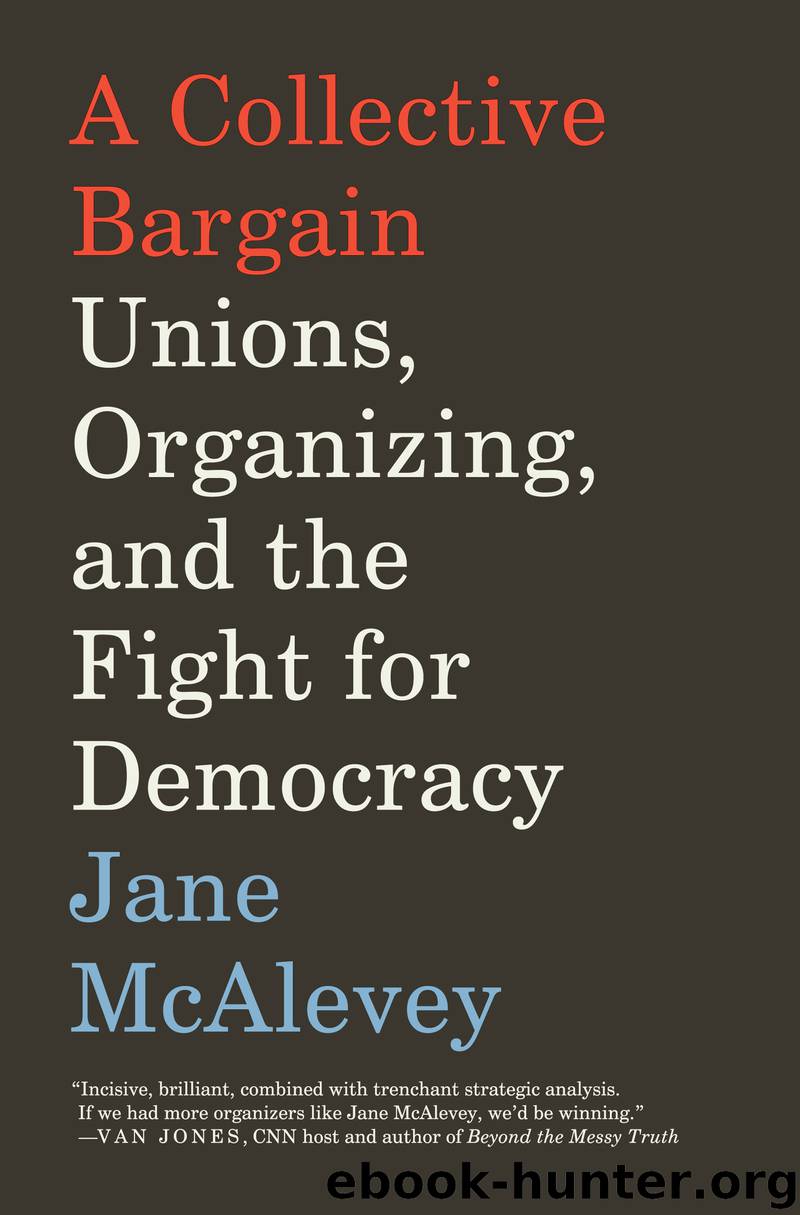A Collective Bargain by Jane McAlevey

Author:Jane McAlevey
Language: eng
Format: epub
Publisher: HarperCollins
Published: 2019-11-18T16:00:00+00:00
Epic Systems Reinforces Unions as the Solution
Nonunion workers have long relied on lawsuits, both individual and class action, as mechanisms to challenge unfair practices in employment. Women workers at Walmart won a landmark sex discrimination class action lawsuit in 2011 in Dukes v. Walmart, ending unequal pay, mandatory work meetings at Hooters, male-only company social gatherings, prohibitions the company had against giving women certain types of jobs, and more. African Americans have relied on class action suits to challenge racist employment practices and won dozens of important cases. The 1993 Haynes v. Shoney’s Inc. is a standout. The Shoney’s decision ruled that Shoney’s restaurant chain had “an overt policy of blatant racial discrimination and retaliation” that was “developed and directed by top Shoney management.” Not surprisingly, both Shoney’s and Walmart are headquartered in Southern right-to-work states, which both developed along the same slavery-to-Jim-Crow-to-anti-union legal framework. The outcomes of these big, high-impact cases, along with dozens if not hundreds of wage-theft cases—a popular tactic in the past ten years developed by immigrant worker centers—as well as individual cases, have now been made moot in the face of the U.S. legal system, leaving workers no alternative to tackle huge issues but to form a union. The Epic Systems case is a little complicated, but it’s central to understanding how the American legal system, through corporate-backed lawsuits, has weakened workplace protections.
The May 21, 2018, Epic Systems case was a consolidation of three cases: Epic Systems Corporation v. Jacob Lewis, Ernst & Young LLP v. Stephen Morris, and National Labor Relations Board v. Murphy Oil. Each involved employees alleging they were shorted income and wages under various provisions of the Fair Labor Standards Act, which is the law that governs workplace conditions like overtime rules and meal and other breaks. The court ruled that the Federal Arbitration Act, the law governing arbitrations, superseded the Fair Labor Standards Act. Arbitrations are essentially a private court system in which corporations hire an arbitrator that serves as a judge. It might be obvious that a judicial system where one party hires the judge is a rigged system. The numbers bear this out: according to the Economic Policy Institute, when workers are subjected to forced arbitration versus state court, they win only 38 percent of the time, and, when they do, they get a fraction of the financial settlements that actual courts award.
To make a complicated case simple, the court ruled that workers can be forced, as a condition of employment, to sign mandatory binding arbitration agreements that preclude them from taking their employer to court. But the decision was even worse, as it essentially backs anything the employers want to put into their individual employment contracts, including stipulations that workers can’t discuss issues of concern to them at work, or share attorneys in an arbitration claim. It states that each worker can be forced to individually hire an attorney even for an arbitration case, be required to pay a filing fee to take the employer to arbitration, and pay for the arbitration if he or she loses the claim decision.
Download
This site does not store any files on its server. We only index and link to content provided by other sites. Please contact the content providers to delete copyright contents if any and email us, we'll remove relevant links or contents immediately.
| Anarchism | Communism & Socialism |
| Conservatism & Liberalism | Democracy |
| Fascism | Libertarianism |
| Nationalism | Radicalism |
| Utopian |
The Secret History by Donna Tartt(19088)
The Social Justice Warrior Handbook by Lisa De Pasquale(12190)
Thirteen Reasons Why by Jay Asher(8910)
This Is How You Lose Her by Junot Diaz(6887)
Weapons of Math Destruction by Cathy O'Neil(6280)
Zero to One by Peter Thiel(5802)
Beartown by Fredrik Backman(5754)
The Myth of the Strong Leader by Archie Brown(5507)
The Fire Next Time by James Baldwin(5446)
How Democracies Die by Steven Levitsky & Daniel Ziblatt(5219)
Promise Me, Dad by Joe Biden(5153)
Stone's Rules by Roger Stone(5088)
A Higher Loyalty: Truth, Lies, and Leadership by James Comey(4964)
100 Deadly Skills by Clint Emerson(4925)
Rise and Kill First by Ronen Bergman(4789)
Secrecy World by Jake Bernstein(4753)
The David Icke Guide to the Global Conspiracy (and how to end it) by David Icke(4720)
The Farm by Tom Rob Smith(4512)
The Doomsday Machine by Daniel Ellsberg(4490)
